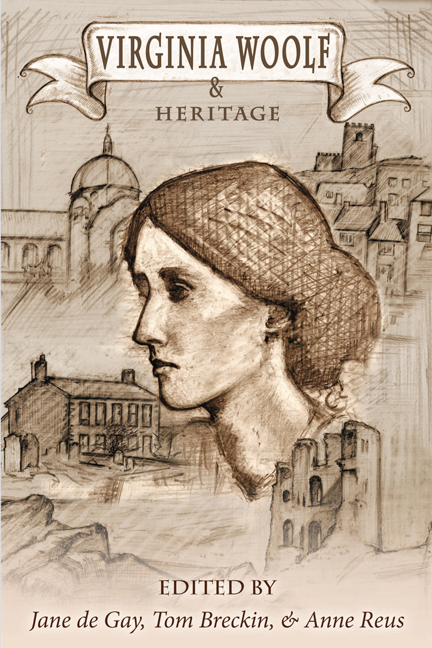Book contents
- Frontmatter
- Contents
- Introduction
- List of Abbreviations
- HERITAGE: A DEBATE
- HERITAGE, EDUCATION, AND MENTORING
- HERITAGE SPACES
- LITERARY AND CULTURAL HERITAGES
- Virginia Woolf in Greece: “Curious contrasts!”: Hellenism and Englishness
- Whose Idea of Tragedy? Mrs Dalloway and the Ancient Greek Tradition
- Silence, Darkness, and Dirt: Mysticism and Materiality in The Years and Between the Acts
- Virginia Woolf Reads the Romantics
- A Critical Heritage: Virginia Woolf, Leslie Stephen, and Walter Scott
- “Where Childhood's dreams are twined”: Virginia Woolf and the Literary Heritage of Lewis Carroll
- QUEER PASTS
- MODERNISM AND HERITAGE
- WRITING LIVES AND HISTORIES
- WOOLF'S LEGACIES
- FINALE
- Notes on Contributors
Whose Idea of Tragedy? Mrs Dalloway and the Ancient Greek Tradition
from LITERARY AND CULTURAL HERITAGES
- Frontmatter
- Contents
- Introduction
- List of Abbreviations
- HERITAGE: A DEBATE
- HERITAGE, EDUCATION, AND MENTORING
- HERITAGE SPACES
- LITERARY AND CULTURAL HERITAGES
- Virginia Woolf in Greece: “Curious contrasts!”: Hellenism and Englishness
- Whose Idea of Tragedy? Mrs Dalloway and the Ancient Greek Tradition
- Silence, Darkness, and Dirt: Mysticism and Materiality in The Years and Between the Acts
- Virginia Woolf Reads the Romantics
- A Critical Heritage: Virginia Woolf, Leslie Stephen, and Walter Scott
- “Where Childhood's dreams are twined”: Virginia Woolf and the Literary Heritage of Lewis Carroll
- QUEER PASTS
- MODERNISM AND HERITAGE
- WRITING LIVES AND HISTORIES
- WOOLF'S LEGACIES
- FINALE
- Notes on Contributors
Summary
There remained only the window, the large Bloomsbury-lodging house window, the tiresome, the troublesome, and rather melodramatic business of opening the window and throwing himself out. It was their idea of tragedy… Holmes and Bradshaw like that sort of thing. (He sat on the sill.) But he would wait till the very last moment…Holmes was at the door. “I'll give it you!” he cried, and flung himself vigorously, violently down on to Mrs. Filmer's area railings. (MD 132)
This passage, where Septimus Smith prepares to commit suicide by throwing himself violently out of the window and onto the railings below, is arguably the dramatic climax and focus of the novel. The metadramatic performance of the scene, as Septimus stages the event and awaits his audience, is confirmed by his final, self-conscious reflection that “it was their idea of tragedy…Holmes and Bradshaw like that sort of thing.”
Virginia Woolf 's own understanding of death and tragedy was cultivated through her early experience of loss, beginning with the death of her mother when she was aged 13. Woolf remembers the performative grief of her father, “the groans, the passionate lamentations” bellowing from the darkened rooms as an oppressive period of mourning which surpassed the “normal limits of sorrow” (MOB 13). Not long after her mother's passing—which was, in Woolf 's own mind, a “genuine tragedy”—she began studying Ancient Greek at King's College, London. In his recent book Hellenism and Loss in the Work of Virginia Woolf, Theodore Koulouris argues that the comfort and solace Woolf found studying Greek during this period is “unquestionable” (43). Indeed, Woolf later reflected on this therapeutic function, remembering that she would often retreat to her room to work on the translation of “some scene in Euripides or Sophocles” (MOB 150) in order to escape her father's violent mood swings and the unbearable atmosphere of their family home, “tangled and matted with emotion” (MOB 45). More importantly, Koulouris claims that Woolf 's formative immersion in Greek literature shaped her “understanding of ‘loss’; the ‘loss’ felt at her mother's death in 1895, at Stella's death in 1897, and during the gradual loss of the paternal figure to an abyss of despair” (31).
- Type
- Chapter
- Information
- Virginia Woolf and Heritage , pp. 96 - 101Publisher: Liverpool University PressPrint publication year: 2017

